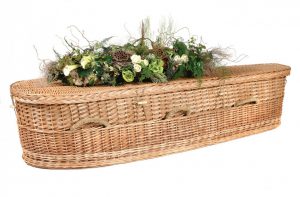SAMIR PURKAYASTHA
Don’t turn forest into coffins — try bamboos for making them.
That is what the leading youth group in India’s north-eastern state of Mizoram is asking the state’s majority Christian populace to do.
Instead of using wood from forest which would mean hacking down trees like teak and sal, the Young Mizo Association (YMA) has tied up with the National Bamboo Mission to promote coffins made of bamboos as part of its “Green Mizoram” initiative.

The move comes close on the heels of ministry of environment expressing concern over the illegal cutting and felling of valuable teak and sal trees in the North Eastern states, including Mizoram.
According to the Forest Survey of India (FSI) report 2011, India’s forest cover has decreased by 367 sq km—despite some states showing some positive growth— in the last two years with the maximum amount of forest cover disappearing from the northeast states and Andhra Pradesh.
As compared to FSI report 2009, Manipur has lost a forest cover of 190 sq km, Nagaland 146 sq km, Arunachal Pradesh 74 sq km, Mizoram 66 sq km) and Meghalaya 46 sq km.
With a territorial area of 21,081 square kilometre, Mizoram has 19,117 square kilometre of forest cover while the forest area classified as very dense thick forest is merely 134 square kilometre.
The basic objective behind its coffin-campaign is to discourage people from using wood as far as possible.
The YMA believe its campaign would generate awareness against felling of tress, apart from tapping state’s huge bamboo resources.
“Large number of trees is felled for making wooden coffins. By introducing bamboo coffins, we will be able to save some valuable trees. More importantly, through this we want to send across a preservation message to the people. This is part of our campaign for protection of the environment,” YMA general secretary Vanlalruata told this writer over phone from Aizawl.
“Within a few months of launching the initiative, we have already started getting positive response. Though there is no exact figure of how many such coffins are being used, the encouraging sign is that the bamboo-version is now available even in remote places,” he added.
Interestingly, in every village and town in Mizoram, it is the YMA volunteers that carry out the activities of digging grave and arranging coffins for the dead since the inception of the organisation in 1935.
Naturally, the YMA volunteers, in its 792 branches spread across the state, are now rooting for the bamboo-coffins.

“As far as possible we now try to get a coffin made of bamboo,” said Lalreldika, a youth from state’s Kolasib area who used bamboo-coffin for the burial of his uncle last month. He said earlier they used to depend on the supply from the YMA Central Committee in Aizawl for such coffins. But now it can be locally procured.
However, despite some positives, it will be too early to write the epitaph of wooden coffin in the state. As pointed out by L R Sailo, press secretary to the chief minister, making coffins out of bamboo is a complicated and time consuming process.
“Bamboo coffin is a good and innovative idea. It is definitely eco-friendly. People here in Mizoram are certainly talking about it. But only time will say whether it can replace the traditional wooden coffins,” Sailo told this writer.
The bamboo mat boards or plies required to make bamboo coffins too are not readily available. There are only a few bamboo board manufacturers in the State like Ceeke Bamboo & Wood Industry, Grace RTP Bamboo Industry, Zonun Matply and Venus Bamboo Products.
There is however a good news for green crusaders. Bamboo Development Agency, a society constituted by Mizoram government, has recently taken up slew of measures to meet the state’s growing demand for bamboo boards. It has also set up two units at Darlak and Bairabi areas of the state for the purpose.
The YMA is naturally quite exuberant about its initiative. Its leader claimed that the youth body would continue its “campaign for green coffin” till every single dead in the state was “laid to eternal rest” in a bamboo-coffin.
To further promote its idea, the association has recently donated 30 adult-sized and 10 children-sized such coffins to Aizawl Civil Hospitals, 20 adult-sized and five children sized coffins to Synod Hospital, Durtlang ; and 14 adult-sized and five children sized coffins each to seven private hospitals in Aizawl.
These coffins were used to send bodies to rural areas.
Apart from this, it is also supplying bamboo-coffins on regular basis to all its branches.
On what about cutting of bamboo bushes for making coffins, Vanlalruata argued that a bamboo tree grows faster than trees like teak and sals, so it takes less time to replenish.
if most of the Christian dominated states of the North East follow the same example of using bamboo coffins then it would be a huge afforestation campaign. For this to actually materialise, it says, the Church and other Christian bodies need to take initiative
According to the YMA, if most of the Christian dominated states of the North East follow the same example of using bamboo coffins then it would be a huge afforestation campaign. For this to actually materialise, it says, the Church and other Christian bodies need to take initiative.
Apart from environmental factor, bamboo-coffin is also cost effective. The production cost for a high-quality bamboo coffin in Mizoram is calculated by bamboo mission to be around Rs. 2500.
Coffins made of teak wood cost around Rs 14,000, and the ones made of hardwood from the trunk of jackfruit and other such trees cost Rs 9,000. Even the cheapest softwood coffin with a sunmica coat is available in the state for a price of Rs 2500 to Rs 3500.
According to an Aizawl-based senior Journalist, Zodin Thanga the YMA always plays an important role to initiate a social change in the state and its green initiative has already started showing results.
The state Environment and Forests Minister H Rohluna too lauded the YMA’s initiative at a function organised in Aizawl to observe “Green Mizoram Day.”
As part of its green crusade, the youth organisation has set a target of planting 50,000 saplings across the state during this monsoon. Besides, it has launched a village-to-village awareness drive against the traditional practice of jhum or shifting cultivation.
This age old slash-and-burn practice of cutting and burning of forests or woodlands to create agricultural fields has been identified by the environment ministry as a primary reason for the loss of state’s forest cover.
Another traditional practise the YMA is asking the people of the state to forgo is poisoning of water bodies for fishing, a common tribal practise in the region.
YMA believe its campaign would generate awareness against felling of tress, apart from tapping state’s huge bamboo resources
The Mizo tribe has an age old tradition of protecting and conserving biodiversity under the initiatives of indigenous community institutions like YMA. The history of protection and management of community forests in Mizoram dates back to pre-independence days. Until recently, each and every village had its own forest reserves which were known as ‘Safety Reserves’.
“In the recent past we had lowered our guard in protecting forest as we focused on checking other social issues like drug trafficking, but now alarmed by the depleting forest cover we have decided to give a renewed thrust on environment protection,” Vanlalruata said.
Only after the next forest survey report, the success of its green initiative could be assessed. But as of now YMA is all for green coffin.













